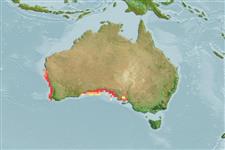Elasmobranchii (tubarões e raias) (sharks and rays) >
Orectolobiformes (Carpet sharks) >
Orectolobidae (Carpet or nurse sharks)
Etymology: Sutorectus: sutor, Latin fopr cobbler, referring to Cobbler Carpet Shark or Cobbler Wobbegong, its local name in South and Western Australia; orektos (Gr.), stretched out, presumably referring to its long nasal barbels and/ or alluding to its affinity with the closely related genus Orectolobus (See ETYFish); tentaculatus: -atus (L.), provided with: tentacule (L.), feeler, i.e., small tentacle, referring to unbranched dermal lobes (nasal barbels) on head (“tentaculis cutaneis simplicibus”) (See ETYFish).
More on author: Peters.
Environment: milieu / climate zone / depth range / distribution range
Ecologia
marinhas associadas(os) a recifes; intervalo de profundidade 0 - 35 m (Ref. 106604). Temperate; 26°S - 35°S, 113°E - 139°E (Ref. 54916)
Eastern Indian Ocean: Australia.
Comprimento de primeira maturação / Tamanho / Peso / Idade
Maturity: Lm ?, range 65 - ? cm
Max length : 92.0 cm TL macho/indeterminado; (Ref. 247)
Found inshore on the continental shelf (Ref. 6871). Frequents rocky and coral reef areas. Biology almost unknown. Ovoviviparous (Ref. 6871). May possibly grow to 200 or 300 cm TL.
Ciclo de vida ou comportamento de acasalamento
Maturidade | Reprodução | Desova | Ovos | Fecundidade | Larvas
Ovoviviparous, embryos feed solely on yolk (Ref. 50449).
Compagno, L.J.V., 1984. FAO Species Catalogue. Vol. 4. Sharks of the world. An annotated and illustrated catalogue of shark species known to date. Part 1 - Hexanchiformes to Lamniformes. FAO Fish. Synop. 125(4/1):1-249. Rome, FAO. (Ref. 247)
Status na Lista Vermelha da UICN (Ref. 130435: Version 2024-1)
Ameaça para os humanos
Traumatogenic
Uso pelos humanos
Pescarias: sem interesse
Ferramentas
Relatórios especiais
Baixar XML
Fontes da internet
Estimates based on models
Preferred temperature (Ref.
123201): 16.9 - 22.5, mean 18.2 °C (based on 64 cells).
Índice de diversidade filogenética (Ref.
82804): PD
50 = 1.0002 [Uniqueness, from 0.5 = low to 2.0 = high].
Bayesian length-weight: a=0.00389 (0.00180 - 0.00842), b=3.12 (2.94 - 3.30), in cm total length, based on all LWR estimates for this body shape (Ref.
93245).
Nível Trófico (Ref.
69278): 3.8 ±0.6 se; based on size and trophs of closest relatives
Resiliência (Ref.
120179): Baixo, tempo mínimo de duplicação da população 4,5 - 14 anos (Fec assumed to be <100).
Fishing Vulnerability (Ref.
59153): High vulnerability (57 of 100).
Nutrients (Ref.
124155): Calcium = 4.88 [0.63, 20.10] mg/100g; Iron = 0.138 [0.033, 0.385] mg/100g; Protein = 19.9 [17.6, 22.0] %; Omega3 = 0.226 [0.091, 0.547] g/100g; Selenium = 5.68 [1.45, 17.61] μg/100g; VitaminA = 36 [10, 133] μg/100g; Zinc = 0.399 [0.185, 0.850] mg/100g (wet weight);
